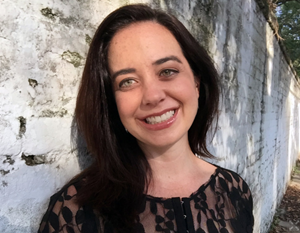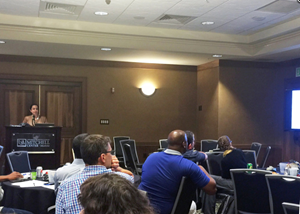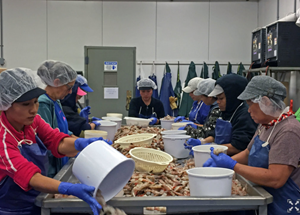
Jacqueline Fiore is an economic analysis and policy Ph.D. student at Tulane University. (Provided by Jacqueline Fiore)
Natural and manmade disasters often involve long-term effects, but the majority of follow-up research tends to focus on the biophysical impacts rather than the social. Jacqueline Fiore, a Louisiana resident, understands how disasters such as hurricanes and oil spills can impact local industries, citizens, and ecosystems.
Jacqueline, a Ph.D. student in Tulane University’s Economic Analysis and Policy program and a GoMRI Scholar with the Consortium for Resilient Gulf Communities (CRGC), uses applied economics to study the Deepwater Horizon oil spill’s socioeconomic impacts on Gulf fisheries, assess their ability to recover, and help inform future oil spill response.
Her Path
Jacqueline’s journey into oil spill research began on the other side of the globe after she completed a bachelor’s degree in communications and two master’s degrees in epidemiology and economics. She worked for Michigan State University conducting epidemiological studies on malaria in Malawi, Africa with the National Institutes of Health Malawi International Center for Excellence in Malaria Research program. While she enjoyed this research, Jacqueline felt that she was still searching for her “niche” and realized that she wanted to learn econometric methods for public health research.
Jacqueline entered Tulane University’s Ph.D. program in economic analysis and policy. Her advisor Dr. K. Brent Venable introduced her to the CRGC studies on Gulf communities’ resilience to large-scale environmental disasters such as the 2010 Deepwater Horizon oil spill. Jacqueline joined the project’s economics sub-team with her other two advisors RAND Corporation economists Drs. Craig Bond and Shanthi Nataraj and uses economic analysis to study the oil spill’s impact on the fishing industry.
Her Work
Jacqueline explained that the concept of resilience refers to human communities’ ability to respond, reorganize, and recover during and following a damaging event. She continued, “The dynamics of certain indicators, such as fisheries landings and revenues, can provide information about the abilities of fisheries to withstand and recover from oil spill events.”

Jacqueline presents her preliminary findings at the CRGC All-Hands Meeting in Mobile, Alabama, in June 2016. (Photo by Elizabeth Thornton of RAND Corporation)
Jacqueline contacted approximately 70 fisheries and tourism representatives for insight into the best data sources for her research and identified National Oceanic and Atmospheric Association (NOAA) commercial fishing data and state-maintained trip ticket datasets as the most comprehensive sources for pre- and post-spill data. She then worked with the CRGC economics sub-team to identify the best model specifications for analysis. She plans to combine these specifications with public- and restricted-access data to assess the spill’s effects on fisheries landings for select Gulf fish species.
Jacqueline’s research will quantify impacts to fisheries landings in pounds and revenues over time, accounting for variables such as number of fishing trips, type of gear used, and total area fished. She will complement anecdotal accounts and time-series data with an econometric assessment to place the spill’s economic impacts in context with the impacts of the 2005 hurricane season. Ultimately, Jacqueline hopes that her findings will help the fisheries industry and associated communities prepare for the way various Gulf fish species and fishers may respond to future disasters.
Her Learning
Jacqueline discovered that the research process can be challenging, particularly when working with human-related data. She recalls learning about and adhering to data confidentiality rules when using government datasets, adjusting her economic models to match each data source’s availability and variables, and even reframing how she communicated her findings to various audiences. For example, she adapted presentations of her preliminary results at CRGC All-Hands Meetings to better suit an audience without an economics background. Rather than focusing on her work’s detailed methods and techniques, which the audience would not be familiar with, she focused on graphs that illustrated trends in her findings.

Dominik’s Seafood Inc. – a shrimp processing plant in Bayou La Batre, Alabama – is one of the many local Gulf-area businesses that could benefit from Jacqueline’s research with the economics sub-team. (Photo by Jacqueline Fiore)
Jacqueline also experienced how her research can impact and be impacted by a wide range of people. CRGC All Hands Meetings are attended by the consortium’s technical and stake holder advisory committees, principal investigators, research staff, and graduate students, allowing Jacqueline to gain valuable feedback about her findings from a diverse audience. Fellow researchers offered insights into why some fish species may have been more affected after the spill than others and theorized how fisheries closures might cause some fish species to appear more resilient than they may actually be. She also met with Deepwater Horizon-impacted community members and observed seafood processing plants on a field trip to Bayou La Batre, Alabama. The plant’s employees may use her results to identify which fish species may be the most affected and to estimate financial impacts should another disaster occur.
Her Future
Jacqueline plans to complete her Ph.D. in spring 2018 and hopes to pursue a research program or program management position where she can use her training and expertise in economics and epidemiology. She is particularly interested in industry- or government-initiated projects that are implemented in an academic or private sector, because she “enjoys multidisciplinary collaboration, quick turnaround, and the ability to measure her findings’ impact on the target audience.”
She has found that a person’s career path can evolve based on interactions with others, job opportunities, and academic training and advises that students take time for self-reflection on their life experiences. “Try to learn something from each opportunity and challenge you encounter,” she said. “Your initial goals may look much different from the final outcome.”
Praise for Jacqueline
Craig Bond and Shanthi Nataraj praised Jacqueline’s enthusiasm and contributions to their work. “She not only does what would be expected of a research assistant – conducting literature reviews and data analyses – she also goes above and beyond and contributes to the intellectual design of the effort. Perhaps as importantly, she always does so with a smile,” said Bond. They explained that Jacqueline is considered a full partner on the research, “She has become a valuable colleague over the past two years, and we look forward to our continued collaboration.”
The GoMRI community embraces bright and dedicated students like Jacqueline Fiore and their important contributions. The GoMRI Scholars Program recognizes graduate students whose work focuses on GoMRI-funded projects and builds community for the next generation of ocean science professionals. Visit the CRGC website to learn more about their work.
************
The Gulf of Mexico Research Initiative (GoMRI) is a 10-year independent research program established to study the effect, and the potential associated impact, of hydrocarbon releases on the environment and public health, as well as to develop improved spill mitigation, oil detection, characterization and remediation technologies. An independent and academic 20-member Research Board makes the funding and research direction decisions to ensure the intellectual quality, effectiveness and academic independence of the GoMRI research. All research data, findings and publications will be made publicly available. The program was established through a $500 million financial commitment from BP. For more information, visit http://gulfresearchinitiative.org/.
